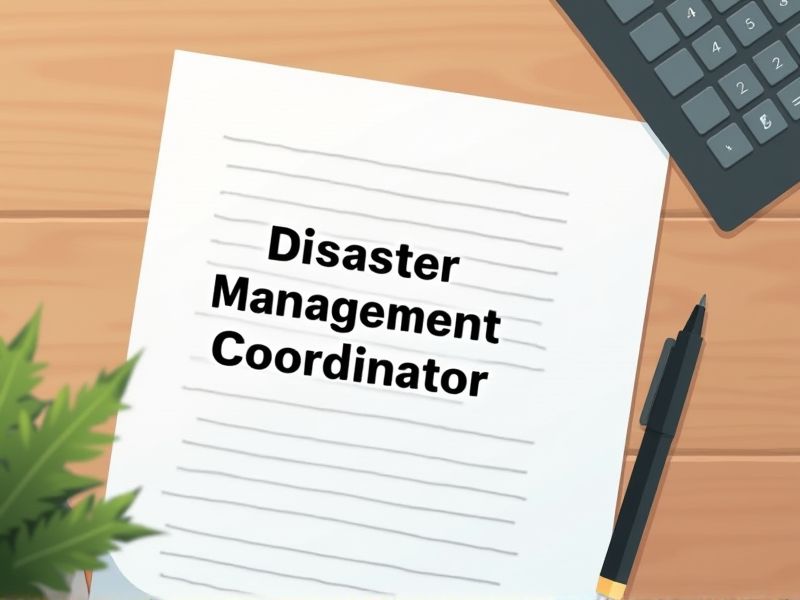
Disaster Management Coordinators must operate effectively in high-stress environments, demanding precise knowledge and capabilities. Certain certifications provide essential skills in crisis management, emergency response, and resource coordination. These certifications ensure that coordinators can adhere to legal standards, utilize best practices, and communicate efficiently during emergencies. Important certifications needed for a Disaster Management Coordinator include:
Certified Emergency Manager (CEM)
The Certified Emergency Manager (CEM) credential ensures that a Disaster Management Coordinator possesses comprehensive knowledge and expertise in emergency preparedness and response. Having a CEM guarantees a standardized level of competency, aligning with current best practices and protocols. This certification enhances credibility and trust, which can be crucial during crisis coordination and decision-making. Furthermore, the continuous professional development requirement for CEM holders ensures they remain updated with evolving disaster management strategies.
Associate Emergency Manager (AEM)
Disasters demand swift, coordinated responses, and an Associate Emergency Manager (AEM) provides specialized knowledge in emergency protocols that enhance a Disaster Management Coordinator's effectiveness. The AEM's expertise in risk assessment and mitigation strategies ensures that potential threats are identified and addressed before they escalate. Their skills in communication and stakeholder engagement foster stronger collaboration among diverse response teams. Training in regulatory compliance and resource optimization by an AEM ensures that disaster management efforts align with legal requirements and maximize available assets.
FEMA Emergency Management Institute (EMI) Certification
Obtaining FEMA Emergency Management Institute (EMI) Certification equips a Disaster Management Coordinator with essential skills and knowledge to effectively coordinate disaster response and recovery efforts. Certification ensures that the coordinator is well-versed in standardized procedures, enhancing efficiency in crisis situations. It also validates professional competence, fostering trust among stakeholders and agencies involved in disaster management. Certified coordinators are better prepared to implement strategies that can mitigate risks and improve community resilience.
Incident Command System (ICS) Certification
The ICS Certification provides a standardized approach to incident management, ensuring Disaster Management Coordinators operate effectively during crises. This certification equips coordinators with essential skills for clear communication and resource allocation, vital for efficient disaster response. Consistent training in ICS fosters interoperability among agencies, enhancing collaborative efforts during emergency situations. ICS Certification ensures adherence to best practices, reducing the impact of disasters and optimizing recovery efforts.
National Incident Management System (NIMS) Certification
NIMS Certification equips Disaster Management Coordinators with standardized procedures to effectively coordinate response efforts. Acquiring this certification ensures they are adept at resource management, which is crucial during emergencies. The certification enhances interagency communication, fostering better collaboration during crises. Compliance with NIMS also aligns with federal requirements, facilitating access to federal funding and support during disasters.
Certified Business Continuity Professional (CBCP)
A Certified Business Continuity Professional (CBCP) ensures comprehensive planning and response strategies are in place, optimizing recovery time after disruptions. They provide expertise in identifying risks and vulnerabilities, improving an organization's resilience to disasters. The CBCP credential signifies advanced knowledge in best practices, facilitating effective communication and coordination during crises. Their specialized skills lead to minimized operational impacts and financial losses during disasters.
Certified Crisis Management Professional (CCMP)
Certified Crisis Management Professionals (CCMP) offer structured expertise crucial for effective disaster management coordination. Their training ensures the implementation of best practices, leading to reduced response times and increased resource efficiency during emergencies. An in-depth understanding of crisis dynamics allows them to mitigate potential risks and enhance strategic communication among stakeholders. Their certification helps establish trust and credibility, which is essential in high-stakes disaster scenarios.
Project Management Professional (PMP)
Employing Project Management Professional (PMP) certification for a Disaster Management Coordinator enhances the ability to efficiently plan and organize resources. This certification instills rigorous risk assessment skills, crucial for anticipating and mitigating potential disaster scenarios. PMP training equips coordinators with the expertise to communicate effectively with diverse teams, ensuring clear strategies during emergencies. The structured methodologies endorsed by PMP enable better control and adaptability in dynamic disaster environments.
Certified Risk Management Professional (CRMP)
Certified Risk Management Professional (CRMP) enhances a Disaster Management Coordinator's ability to comprehensively evaluate risks, leading to more informed decision-making. The certification equips coordinators with structured frameworks and methodologies to identify potential threats effectively, improving response strategies. CRMP credentials foster credibility and trust among stakeholders, crucial for implementing risk mitigation plans. Rigorous training ensures coordinators stay updated on evolving risk factors, aligning disaster management practices with global standards.
OSHA 30-Hour Safety Certification
Obtaining OSHA 30-Hour Safety Certification enhances a Disaster Management Coordinator's ability to recognize and mitigate hazards in high-risk environments. This certification equips coordinators with advanced knowledge on regulatory compliance, ensuring adherence to safety standards during disaster response. The training improves the coordinator's capability to implement effective safety protocols, reducing injury risks among disaster response teams. Certification fosters a culture of safety, critical for efficient and organized disaster management operations.
Summary
When you acquire certifications as a Disaster Management Coordinator, your expertise and credibility in emergency preparedness increase. This can lead to enhanced trust from stakeholders and ensure more efficient response strategies during crises. Your team may gain access to advanced tools and resources, improving overall disaster resilience. Furthermore, the organization's reputation can be strengthened, potentially attracting additional funding and partnerships.
